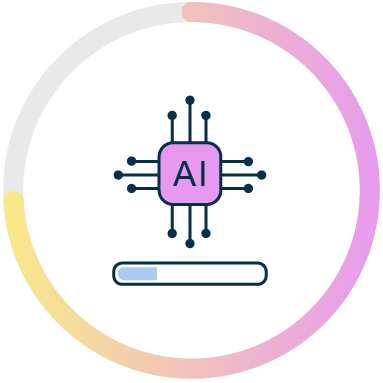
Unlocking Vietnam's AI Potential 2025
According to AWS’s latest report, Unlocking Vietnam’s AI Potential, AI adoption[1] is accelerating rapidly across the country. In the past year alone, 47,000 businesses[2] in Vietnam began using AI — equivalent to an average of over five an hour in the last year. This brings the total percentage of AI-adopting firms to 18%, up from 13% a year ago, representing a growth rate of 39%. Today, almost 170,000 businesses in Vietnam — or nearly a fifth of all companies — have adopted AI.
The Vietnamese government has taken important steps to drive its digital and AI transformation. In 2021, it launched its landmark AI strategy, which considered the advent of AI as a ‘Fourth Industrial Revolution’. Vietnam’s 2021 National Digital Transformation Program by 2025 (with a vision towards 2030) aims to digitise 90% of government operations and grow the digital economy to 30% of GDP by 2030. By 2030, Vietnam aims to be in the group of 20 leading countries globally in the development and universalisation of AI solutions, bringing its benefits to Vietnamese society, people and creating systems of modern governance.
The program will look to attain this through initiatives such as training 1 million digital professionals, as part of the three strategic pillars set forth in its December 2023 Digital Transformation Agenda (DTA). The launch of Vietnam’s DTA in 2023 leverages digital technologies to drive a digital government, a a digital economy, and a digital society.

77% of those who have adopted AI say the technology is likely to increase their revenue in the next year, by an average of 11%.

58% expect cost savings thanks to AI, averaging 20%.
These gains are enabling businesses to redirect their focus toward improving customer relationships (32%), developing new products and services (30%), and reducing employee workloads (28%). These benefits resonate with the stated aims of the Vietnamese government, to universalise and promote the use of AI in the whole population, in order to improve labour productivity and move towards the formation of a smart and effective digital society. Looking ahead, optimism remains strong:

61% of businesses that have adopted AI report increased revenue, with an average increase of 16%.

Meanwhile, 66% say they have already seen significant productivity improvements.
Across the Vietnamese business landscape, businesses are realising the benefits of AI adoption:
.jpg)
Digital society
Recognising the critical role of a highly-digital-skilled workforce in driving robust national digital transformation. The government plans to upskill young talent intechnologies such as AI, cloud computing, Internet of Things (IoT), blockchain, big data, and quantum technology.

Digital government
Encompassing the use of digital technologies and information and communication technologies to enhance the delivery of government services, improve public administration, and increase government transparency and efficiency.
.jpg)
Digital economy
Integrating digital technologies, i.e. internet and advanced computing, into economic processes. The country’s digital economy revenue was estimated to be worth $166.4 billion in 2022, accounting for 14.26% of its GDP.
The Vietnamese government is looking to prioritise a number of large-scale, breakthrough technology projects to address the major and strategic problems of the country. Particularly notable initiatives include:
Initiative 26: National AI. Vietnam aims to establish a national AI hub for research, training, and testing, develop a Vietnamese-specific large language model, and integrate AI into education, healthcare, law, and public administration. The plan includes creating a controlled environment for AI testing, expanding AI skills training, building advanced infrastructure such as AI supercomputers, and fostering investment and talent for specialized AI chip development.
Initiative 27: Therapeutic gene technology. Vietnam is seeking to master gene technology and AI in precision medicine and drive international cooperation in the development of AI in drug design and treatment for common diseases, bringing the benefits
AI adoption among businesses in Vietnam is growing rapidly – demonstrated by a growth rate of 39%.
Close to 170,000 businesses in Vietnam have already adopted AI.
77% of those businesses that have adopted AI expect it to increase their revenue within the next year.
Reflecting the priorities outlined in the government’s digital transformation agenda, 55% of Vietnamese businesses report that low digital skills are the main barrier to AI adoption and expansion.
Vietnam’s untapped AI potential is marked by the fact that only 9% of AI-adopting businesses have reached the most transformative stage of AI integration, with significant opportunity for businesses to progress to this stage.
Key findings from this study
Vietnamese businesses and government must now seize the opportunity to progress to the most advanced stage of AI adoption, harnessing the technology to innovate within their industries.

74% of Vietnam’s businesses are focused primarily on more basic uses of AI and on incremental gains (e.g., driving efficiencies and streamlining processes), rather than innovation (e.g., developing new products or disrupting industries). These businesses are using publicly available chatbots for routine tasks such as scheduling assistants and purchasing ready-made AI solutions.

17% have advanced to the intermediate stage of AI adoption. These companies are moving beyond isolated applications and integrating AI across various business functions, resulting in efficiency improvements and more innovative approaches to customer experience.

Only 9% of Vietnamese businesses have reached the most transformative stage of AI integration, where they are using AI for its most advanced purposes. These organisations are combining multiple AI tools or models for complex tasks, and creating custom AI systems, which is transforming their operations comprehensively.
The growth rate of AI adoption in Vietnam is impressive – and there is opportunity for businesses to go further. But when going beyond adoption figures and looking deeper at how businesses are implementing AI, most Vietnamese organisations remain at basic levels of adoption:
The digital opportunity
Vietnam’s startups are notably optimistic about the transformative potential of AI. 91% of startups believe AI will transform their industry within the next five years, compared to 74% of Vietnamese businesses overall. This underscores how Vietnam’s fast-moving startup sector is not just participating in the AI revolution but driving it - and will be crucial to the country’s competitiveness in the years ahead.

35% of startups are using the technology to develop new AI-driven products and services.

40% of startups employ AI-specific talent, indicating a strong commitment to building and nurturing in-house AI expertise, ensuring businesses can develop, deploy, and refine AI-driven strategies.

At the leading edge, 21% of startups that have adopted AI are already at the most advanced stage, combining multiple AI tools or building proprietary systems to create new services, disrupt industries, and scale more rapidly.

31% of startups have AI at the core of their business proposition and operations.
Startups are emerging as leaders for AI innovation in Vietnam. They aren’t just using AI to improve efficiency — they are beginning to build entirely new products and business models around the technology that would have been impossible just years ago. In fact, more than half (55%) of Vietnamese startups say they are leveraging AI in some way across their operations. Over half (51%) of startups that have adopted AI are at the advanced or intermediate stages of use.
Vietnamese startups: Driving AI innovation

AI Hay is a Vietnam-first, AI-powered platform revolutionising knowledge discovery through social, community-driven generative AI search. Since its launch, the app has had over 15 million downloads and has processed over 100 million questions monthly, serving millions of Vietnamese daily.
The platform leverages AWS’s AI chips, such as AWS Trainium and AWS Inferentia2, for energy-efficient, cost-effective training of their AI models, which are built on Amazon SageMaker and Amazon Bedrock. This has allowed AI Hay to resolve over 100 million questions asked in Vietnamese, with an average of 80% satisfaction on the answers. Using GenAI, they have also been able to better correlate questions with other similar queries and answers, with 4 in 5 users (85%) saying the answers matched their interest.
By empowering businesses of all sizes to adopt and scale advanced AI solutions, Vietnam can accelerate productivity growth and digital progress across its business landscape. Moving beyond basic adoption for businesses of all sizes is key to unlocking the full benefits of AI for Vietnam’s economy and society. Recent research by the Telecoms Advisory Service, on behalf of AWS, found that cloud and AI added over 1.5 billion USD to Vietnam’s GDP in 2023. The research also found that the cloud (as a whole) is set to add 2.8 trillion USD to the Asia-Pacific region GDP by 2030, with nearly $203 billion alone coming from cloud-enabled AI.

For 80% of large enterprises, their AI adoption remains at basic levels (compared to 49% of startups), where they are focused on incremental gains, such as driving efficiencies and streamlining processes. While large enterprises are quick to enable localised productivity and efficiency gains, their younger, more agile startup counterparts are leading the way in implementing AI’s most sophisticated and transformational uses (21% of AI-adopting startups are using AI at the most advanced level).

Only 11% of Vietnam’s large enterprises are delivering a new AI-driven product or service by harnessing AI’s deeper potential – less than a third of the proportion of startups (35%).

Closing this gap between tech-driven startups and larger, established enterprises, present a significant
opportunity to grow Vietnam’s economy and increase competitiveness and innovation.
While adoption is now widespread, larger enterprises are an area of untapped potential, as they are not yet harnessing the most advanced uses of AI. While 41% of large enterprises[3] have adopted AI technologies, significantly greater than the national average of 18%, most are currently not using them as deeply as startups, resulting in an emerging ‘two-tier’ AI economy. There is significant opportunity here to accelerate this advanced use, as businesses begin to develop roadmaps for adoption. Already, 12% of Vietnamese businesses report that they have a comprehensive AI strategy – increasing this number presents an unparalleled opportunity for closing the innovation and growth gap across Vietnam’s business landscape.
Large enterprises represent significant untapped potential

Techcombank is accelerating the future of digital banking in Vietnam by leveraging Amazon Q Developer. In its initial pilot with 50 developers, the bank saw impressive results—internal team satisfaction scores reached 80%, reflecting the tool’s positive impact on productivity and code quality.
Encouraged by this success, Techcombank successfully scaled the deployment to approximately 600 IT developers with 100% active engagement, resulting in a 40% quarter-over-quarter increase in output per full-time employee across agile teams.
With Amazon Q Developer, Techcombank accelerated the development cycle of Techcombank Mobile, the bank’s flagship digital banking application. By utilizing features such as Code Suggestions, Fix and Explain Code, and AI Commit Message, Techcombank significantly reduced feature development time. Notably, over 70% of developers reported saving 5-10 hours weekly.
These improvements have empowered Techcombank to respond swiftly to customer needs, delivering personalized and seamless digital banking experiences to its 16.5 million clients across Vietnam.
To ensure all businesses can confidently adopt AI and capitalise on its full potential, Vietnam must address four key concerns:
Four key barriers to AI integration
Businesses across Vietnam identify the digital skills gap as the single most important challenge to their AI adoption. A lack of digital skills was the highest reported barrier, with 55% of businesses saying it prevents them from adopting or expanding their AI use. Businesses also expect that AI literacy will be important for 50% of jobs within the next three years, yet only 24% of businesses feel prepared with their current skillset.
Less than one in five (19%) of employees have participated in any sort of digital training or upskilling in the past year.
As a result of this skills gap, businesses say they would be willing to increase a salary offer by 40% to a candidate with strong AI skills.
Vietnamese businesses are facing increasing compliance costs, estimating that $18 out of every $100 they spend on tech goes towards compliance-related costs.
While these costs are lower than some neighbours (such as the Philippines and Indonesia) this still amounts to almost a fifth of their tech spend, and 71% of Vietnamese businesses expect these compliance costs to increase further in the next 3 years.
Across the world, businesses are facing growing regulatory uncertainty as new rules are considered for emerging technologies like AI.
When considering the positive impact new regulation might have on their business, the number one reported hope was that new AI regulation would increase confidence among customers (50%), closely followed by creating a stable regulatory environment (47%).
Similarly, regarding concerns around the potential impact of introducing new regulation, businesses express worries about an increase in compliance costs (52%) and a lack of legal certainty around AI use and deployment (41%). This demonstrates the critical importance of taking a pro-innovation approach and providing regulatory certainty to businesses as they consider new technologies.
Over a third (34%) of Vietnamese businesses cite perceived upfront costs as a key barrier to AI adoption.
At the same time, 28% say they need a clearer understanding of AI’s return on investment.
Notably, those businesses that have adopted AI have seen a significant return on their investment —61% of businesses that have adopted AI report increased revenue, with an average increase of 16%.
In November 2021, AWS launched AWS Outposts in Vietnam, enabling customers to run AWS compute, storage, database, and other services locally and access the full range of services available in any AWS Region to build, manage, and scale their on-premises applications. In February 2022, AWS announced plans to launch a new AWS Local Zone in Hanoi, Vietnam, which will help local customers reduce latency of critical workloads, improve the performance of their applications, process data faster, and drive productivity gains. And in August 2022, AWS launched two Edge locations in Hanoi and Ho Chi Minh City in Vietnam, providing secure, reliable, high-performing connectivity to the rest of the AWS global network.
To date, AWS has trained more than 100,000 individuals in Vietnam on cloud skills since 2017. AWS is committed to providing people of varying backgrounds and experiences with the technology skills they need to prepare for the in-demand jobs of the future. AWS provides a variety of training modules to meet learners where they are, including local programs such as the AWS Study Group Vietnam, a volunteer-run community to support students and developers, and the First Cloud Journey program to help train aspiring cloud workers. We also support local businesses in reskilling and upskilling their employees to drive innovation, such as Techcombank, which has upskilled 2,800 employees through AWS Skills Guild.
AWS is committed to supporting innovation in Vietnam
Vietnam has the right tools and the ambition to lead in AI, both through more widespread adoption of the technology, and more advanced and innovation use cases. AWS urges policymakers and industry leaders to take action to unlock AI’s full potential across both startups and large enterprises:
Unlocking the full potential of AI through three crucial actions
This disparity highlights the need for targeted upskilling initiatives, including partnerships between government, industry, and educational institutions. Closing this gap is key to unlocking Vietnam’s next wave of innovation, productivity, and growth.

50% of businesses see AI literacy as crucial.
%20feel%20prepared_%20.png)
Fewer than a quarter (24%) feel prepared.
Streamline access to government funding and build industry-specific digital skills programs:
1. Accelerate private sector digital adoption through boosted skills efforts:

Spending 18% of their tech spend on compliance.

71% anticipate this figure to rise, acting as a barrier to increased AI adoption – businesses therefore risk missing out on key opportunities for growth and innovation.
Maintaining a clear and streamlined regulatory environment will be crucial for fostering confident investment in AI and boosting AI-driven innovation. Additionally, aligning on common international standards, such as the OECD AI definition, will ensure interoperability, regulatory consistency and reduce friction for cross-border innovation. This can help drive compliance costs down for businesses both when dealing within Vietnam and at a global level, and create a stable environment that supports AI adoption. Businesses in Vietnam are facing rising compliance costs on technologies:
2. Establish a pro-innovation and pro-growth regulatory environment:
This attests to the idea that the public sector’s adoption of new technologies remains critical to increasing trust in these technologies.

69% of Vietnamese businesses say they are more likely to adopt and expand their AI use when the public sector leads.

74% of startups say that public sector
adoption is crucial to their ability to scale.
Prioritise digital transformation in healthcare and education (top citizen priorities), use public procurement to drive innovation, and create test-beds and cross-border exploratory projects using AI to deliver new services.
3. Increase public sector adoption of AI:
Vietnam is at a pivotal stage in its AI-driven transformation. With adoption gaining momentum and businesses recognising AI’s ability to boost productivity, competitiveness, and innovation, the country has a real opportunity to capture significant economic benefits. To fully realise this potential, Vietnamese businesses need to move beyond experimentation and embrace deep, strategic integration of AI across operations. Large enterprises must also seize upon the opportunity presented by closing the two-tier gap in AI adoption in order to unlock further revenue and innovation rewards.
Proactive policies, investment in digital skills, and stronger support for both large enterprises and startups will be key to unlocking these gains. By accelerating adoption and embedding AI across sectors, Vietnam can strengthen its economy, enhance competitiveness, and drive innovation—delivering long-term growth and shared prosperity in the years ahead.
Conclusion
Survey
This study was designed with the objective of delving deep into the digital landscape
Perceptions and Attitudes: The survey seeks to unearth the prevailing perceptions and attitudes toward digital technologies, understanding the perceived benefits, challenges, and potential ramifications of both present and emerging tech solutions.
Usage Patterns: This survey gauges the evolving patterns of digital technology usage. We are particularly interested in examining the adoption and implementation levels of technologies, focusing on cloud computing and artificial intelligence.
Barriers and Opportunities: The survey scrutinises the predicted challenges and potential avenues that both businesses and individuals anticipate on their digital trajectory. This involves pinpointing challenges, from skill deficits to regulatory complications, and recognising opportunities for growth, innovation, and market development.
‘Size of the Prize’: The survey shed light on the economic repercussions and growth prospects linked with digital transformation. By elucidating the ‘size of the prize’, we aspire to stress the importance of digital transformation and foster further investments and technology adoption.
Weighting Techniques:
Post-data collection, we applied iterative proportional weight to correct any discrepancies or over-representations in the sample.
Sampling:
Our sampling process used a mix of online panels that are recognised for their validity and reliability. These panels are carefully curated to ensure diverse representation across various demographics. For the business leaders, the panels are selected with a consideration for organisational size, sector, and position within the company. Our objective with the sampling strategy is to achieve an optimal mix that mirrors the actual distribution of our target populations in the respective markets.
In Vietnam:
We conducted a survey of 1,000 nationally representative members of the public, ensuring representation based on age, gender, and region.
We additionally surveyed 1,000 businesses, ensuring representation by their business size, sector, and region.
Methodology
The fieldwork for this study was undertaken by Strand Partners’ research team for Amazon Web Services. The fieldwork was undertaken between 22nd March and 3rd April 2025. This research has followed the guidance set forth by the UK Market Research Society and ESOMAR. For the purposes of this study, business leaders are defined as founders, CEOs, or members of the C-suite in organisations.
‘Citizens’ are nationally representative members of the public based on the latest available census.
For inquiries regarding our methodology, please direct your questions to: polling@strandpartners.com.
Appendix
-
“Adopted AI” or “consistently use AI”: a business that consistently uses at least one AI tool. This would not include businesses that experimented with AI once or twice, or ran a temporary pilot programme, for instance.
-
Calculated based on recent estimations of the total number of active enterprises, which was 940,000: Ministry of Planning and Investment, December 31, 2024.
-
A large enterprise is a business with 500 or more employees, founded 10 years ago or more.
-

